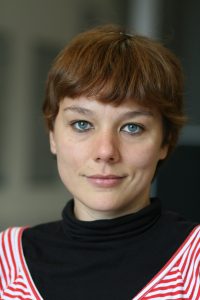
Dr Dolores González Olías
Job: Senior Research Scientist
Employer: CCell
PhD Thesis: Self-powered biosensors for water quality monitoring: sensor development and signal treatment
PhD Supervisors: Dr Mirella Di Lorenzo, Dr Petra Cameron and Professor Jan Hofman
Dolores is a Chemical Engineer with experience in the development of innovative solutions for wastewater treatment of urban and industrial effluents, both in industry and academia.
She took her degree at Complutense University of Madrid and at DTU (Denmark). She specialised in biotechnology and electrochemistry. Her Masters thesis focused on the development of Microbial Fuel Cells for sludge treatment. It was a breakthrough in her career as she decided to focus in using electrochemistry and bioelectricity to improve and complement waste water treatment. It was published as a paper in Water Science and Technology: “Submersible microbial fuel cells for electricity production from sewage sludge”.
After several years working in the UK, Dolores spent some time travelling to assess the water stress and wastewater management in different areas. Now she has joined WISE to continue her work on developing innovative wastewater treatment processes, mainly by using algae and electrochemistry. She wants to focus her PhD in modelling of algae to capture nutrients and biosensor development and signal interpretation by using machine learning techniques.
Industrial Experience
Having finished her degree Dolores carried out an industrial placement at Repsol (Gas & Oil industry) in Spain. Her work involved the improvement of the effluent quality of an industrial WWTP and recovery of hard-metals and by-products by chemical means.
She came to the UK in 2012 to join Johnson Matthey, a catalyst company where she developed a fuel cell to produce in situ hydrogen peroxide by using water and air.
Dolores is currently working on novel biosensors for water quality monitoring by using biofuel cells. She is aiming to develop a self-powered, portable sensor that can be deployed in the field and provide an online and continuous monitoring of contaminants in the water bodies. Her research focuses on detecting the compounds identified in the priority substances list by the Water Framework Directive.
In her first year she was testing different configurations of the biosensor, to enhance its sensitivity, selectivity and response time, as well as maximising the power output of the device.
In the following years she will focus on generating data to build a model capable of correlating the output signal with the type and concentration of contaminant detected.
Research Interests
- Wastewater treatment
- Bio-electrochemistry and electrochemical techniques
- Biosensors development and signal interpretation
- Algae production and nutrient removal
- Membrane technology
- Natural systems for wastewater treatment
- Chemical engineering
- Process optimisation
- Machine learning.





